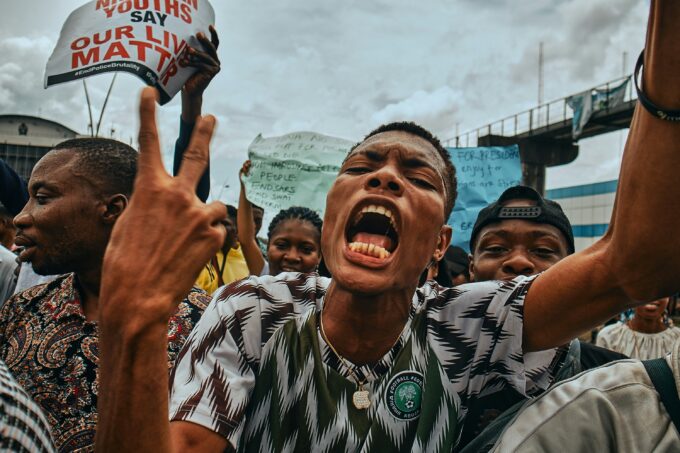

Image by Emmanuel Ikwuegbu.
As he runs for reelection in 2024, former president Donald Trump has made the
outlandish claim that “millions of people [have crossed the United States border] …from prisons, jails and mental institutions to come into our country and destroy our country.” His statement was a combination of two tropes that are often deployed by those seeking political power in election years: Being “tough on immigration,” and—in spite of the fact that he is the first ever major party presidential nominee to be an
indicted criminal —“tough on crime.”
Trump has made such racist and violent language a central tenet of his political career, famously
launching his presidential campaign in 2015 by claiming that Mexico was sending rapists and criminals across the border to the U.S. In seeking reelection he has used
Hitlerian rhetoric, claiming
repeatedly that immigrants are “poisoning the blood of the country.”
Such words have serious impacts, especially on people of color. After Trump won the 2016 presidential race, a
Washington Post analysis found, “that counties that had hosted a 2016 Trump campaign rally saw a 226 percent increase in reported hate crimes over comparable counties that did not host such a rally.” The Leadership Conference on Civil Rights in its report,
Cause for Concern 2024: The State of Hate, has looked further back in time and found that “Each of the last four presidential campaign cycles has shown an unmistakable pattern: Reported hate crimes increase during elections.” The report’s authors expect a spike in violence this year and worry about “the trend of increased hate to continue into the 2024 election.”
It’s not just Trump. During the first presidential debate of this year, which took place on June 28 between Trump and then-presumptive Democratic nominee Joe Biden, there was a
heavy focus on immigration. Trump accused Biden of rolling out the welcome mat to undocumented immigrants, saying, “He decided to open up our border, open up our country.” This is, of course, patently untrue.
In reality, not only did Biden
expand on the harsh anti-immigrant policies that Trump enacted during the years 2016 to 2020, but, in January 2024, as he started his reelection campaign, Biden went as far as channeling Trump’s favored rhetoric of threatening to “
shut down the border.” He did so in the context of garnering Republican support for a bipartisan deal on funding aid to Ukraine that included border enforcement.
When that deal failed, Biden’s team was,
as per an AP report, “planning to campaign to reelect him by emphasizing that Republicans caused the deal to collapse.” A Democratic strategist named Maria Cardona, told AP, “We need to lean into this and not just on border security, but, yes, tough border security coupled with increased legal pathways.”
Then, three weeks before his June debate with Trump, Biden announced “
New Actions to Secure the Border,” which included refusing asylum applications for those who crossed the border without papers. The
National Immigrant Justice Center (NIJC) denounced Biden’s plans saying they “mimic” Trump’s policies and predicted that, “[p]eople in need of asylum who are among already marginalized populations will be most gravely harmed.” NIJC further pointed out that, “People arriving at the U.S.-Mexico border who will be turned back under this policy are overwhelmingly Black, Brown and Indigenous people seeking asylum.”
Now, with Vice President Kamala Harris as their presidential nominee, Democrats are maintaining what the
New York Times called, “decidedly more hard-line” on immigration than in decades.
In other words, Democrats have preferred one-upping Republicans on immigration rather than distinguishing themselves as more humane.
According to Bill Gallegos, a member of the Mexican Solidarity Project who writes for its weekly Spanish-English bulletin, scapegoating immigrants of color helps Republicans “garner votes from a large sector of white voters.” He adds that the anti-immigrant rhetoric also serves to, “make immigrant workers even more vulnerable to exploitation by U.S. companies, and a successful mass deportation campaign of immigrants will smooth the road for a broad attack on all remaining remnants of U.S. democracy.”
Coded language about crime and punishment is also a favorite election campaign tactic. In 2022, the
Washington Post found that “Republicans spent 58% of the money for ads focused on crime” while campaigning for office ahead of the last midterm elections. Because the U.S. criminal justice system
disproportionately ensnares people of color, fueling fear of crime can result in greater criminalization of Black and Brown people.
Just as Democrats have tended to appease Republican demands on harsh immigration enforcement, they have embraced the “tough on crime” rhetoric rather than distancing themselves from it. Before he stepped out of the 2024 presidential race,
Biden, who has a history of supporting law enforcement, pushed a pro-police bill called the Safer America Plan, which
critics say is an extension of Clinton’s 1994 bill and would negatively impact Black and Brown communities.
Lis Smith, a Democratic strategist told the NBC News, “If Republicans thought President Biden would hand them a wedge issue for 2024, they thought wrong.” She added that “It’s going to be very hard to define him as soft on crime.” White House spokesperson Andrew Bates challenged Republicans saying they, “need to commit here and now to joining with President Biden — not obstructing him — in fighting the rising crime rate he inherited.”
The U.S. public
believes crime rates are up, perhaps because
media sources and politicians like Biden and Trump tend to fuel moral panic over crime. Yet, according to
Pew Research, “U.S. violent and property crime rates have plunged since the 1990s, regardless of data source.” The
Federal Bureau of Investigation (FBI) in particular, found a 15% drop in violent crime in the first part of 2024 compared to the previous year. Crimes of murder and rape were down by about 26% each. A recent
Axios reviewof newly available data from U.S. cities found a similar plummeting of crime rates.
Only four years ago, when a nationwide racial justice uprising in the wake of George Floyd’s murder had politicians on the defensive regarding police violence, Democratic leaders such as Nancy Pelosi and Chuck Schumer were
ridiculed for their performative promises of justice. Geri Silva, a longtime prison abolition activist and founder of Families to Amend California’s Three Strikes, denounced the politicians saying, “I have so much disdain for would-be progressive hypocrites.”
Silva points out that, “Many politicians who support progressive policies like ‘care first’ and ‘rehabilitation over punishment’ do so only to please their BIPOC base.” However, they tend to have, what she calls a “dramatic shift during election season,” towards pro-law-enforcement policies, “revealing them to be the worst kind of opportunists.”
None of this is new. The trend of criminalizing people of color with violently racist rhetoric and policies in order to win elections far predates Trump and Biden and can be traced at least as far back as Richard Nixon’s “
Southern Strategy” which he used to great effect in the 1968 and 1972 presidential elections. Realizing that overt racism was not as effective in the wake of the 1965 Civil Rights Act, Nixon relied on provoking white fear of people of color without making explicit reference to race and instead focusing on the dog-whistle phrase of “restoring law and order”—an earlier version of “tough on crime.”
This trend became a winning formula for the Republican Party in particular.
Ronald Reagan ran on an implicitly racist “tough on crime” platform in 1980 and won. He left office
doubling the prison population. In 1988
George H. W. Bush successfully beat Massachusetts Gov. Michael Dukakis after Republican strategist Lee Atwater championed racist ads about Willie Horton, a Black man who had raped a white woman while on a weekend pass from prison. Bush’s campaign pinned the furlough program on Dukakis, and won the election by painting the Democrat as “soft on crime” while hinting to his white conservative electorate that as president, he would ensure Black criminals were kept in their proper place: prison.
African-American history professor, Marcia Chatelain, of Georgetown University told the New York Times, that the Willie Horton debacle “also taught the Democrats that in order to win elections, they have to mirror some of the racially inflected language of tough on crime.”
Four years later, when Arkansas Governor
Bill Clinton ran for president as a Democrat, he interrupted his campaign to oversee the execution of a Black man held on death row, and later boasted, “no one can say I’m soft on crime.” In 1994, two years after Clinton won the presidential race, he kept his campaign promise of being “tough on crime” by signing the 1994 Crime bill into law—a signature policy that fueled mass incarceration in the U.S.
George W. Bush continued his father’s legacy in 2000 when he ran for president—although he became most notorious for his failures in the
Iraq war. By the time Barack Obama ran for president eight years later on an anti-Iraq-war platform, the public’s appetite for being tough on crime had
waned, with a growing awareness that mass incarceration was out of control.
Indeed, Obama’s 2008 and 2012 presidential wins may have been the
exceptions to the “tough on crime” election trend. But a Black man occupying the White House was the ultimate trigger for white supremacists, so much so that Obama’s successor, Trump, laid the groundwork for his eventual presidential campaign by promoting
conspiracy theories of Obama being a non-native-born citizen and a Muslim.
There is a direct link between the election-related violence aimed at people of color and the white supremacist origins of the nation: Settler colonialist decimation of Indigenous peoples, enslavement of Africans, systemic exclusion of immigrants, and Jim Crow segregation.
We live with the legacies of these systems today via on-going institutional discrimination against Black and Brown people, harsh anti-immigrant laws and policies, and racist rhetoric. The violence tends to ramp up quite predictably in election years, in ways that illuminate how the U.S. project of democracy is built on “otherizing” nonwhite people.
Ideas such as
“the great replacement theory,” which Republican
politicians have embraced, motivated a mass shooting 7 months ahead of the 2022 midterm elections in Buffalo, New York by a racist perpetrator whose victims were mostly Black. That same year the FBI recorded a whopping
11,643 hate crimes across the U.S. The incidents were disproportionately aimed at Latinos as well as Black Americans.
Prominent Republican
donors such as
Elon Musk have also promoted the dangerous notion that immigrants are overrunning the nation and destroying American democracy. Musk, who is of white South African descent and was born during apartheid, last year doubled down on a
false claim that Black leftists in South Africa were “openly pushing for genocide of white people.” This language echoes the claims of “
white genocide” that white supremacists in the U.S. have used as justification to target immigrants of color.
Gallegos worries that a “‘successful’ ethnic cleansing campaign against immigrants” would be a part of a campaign to “institutionalize a white Christian nationalist form of apartheid.”
The solution, he says, is to “build a broad united front against fascism,” and engage in an “overall effort to defend and expand democracy” centering on the rights of people of color and immigrants.
The post Election Years Are Dangerous Times for People of Color appeared first on CounterPunch.org.
This content originally appeared on CounterPunch.org and was authored by Sonali Kolhatkar.

